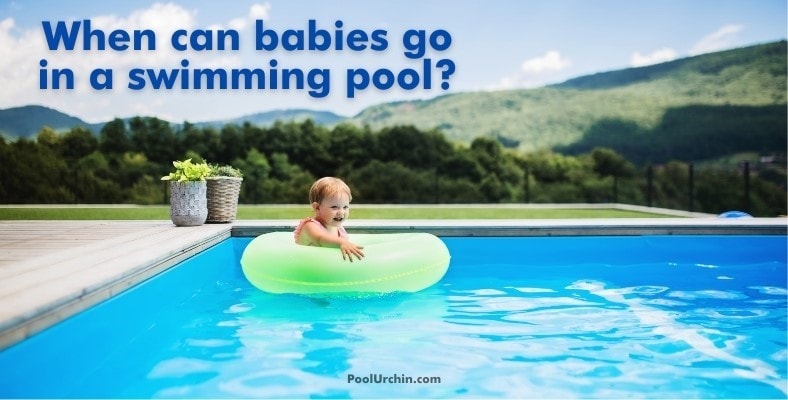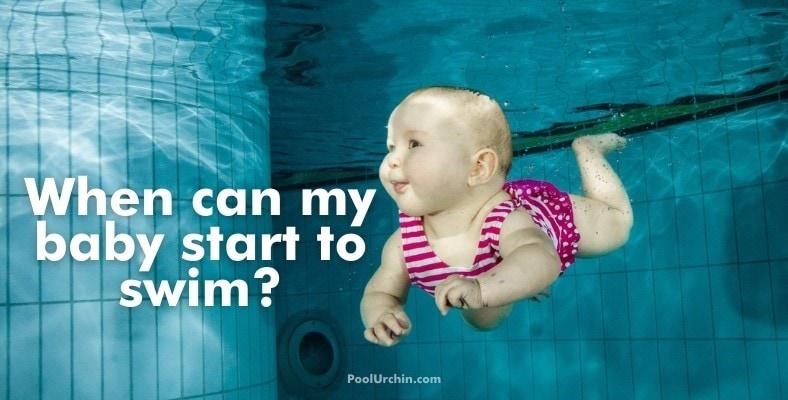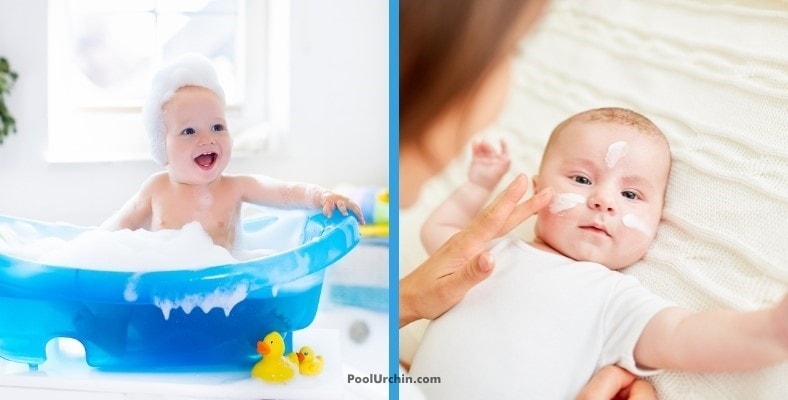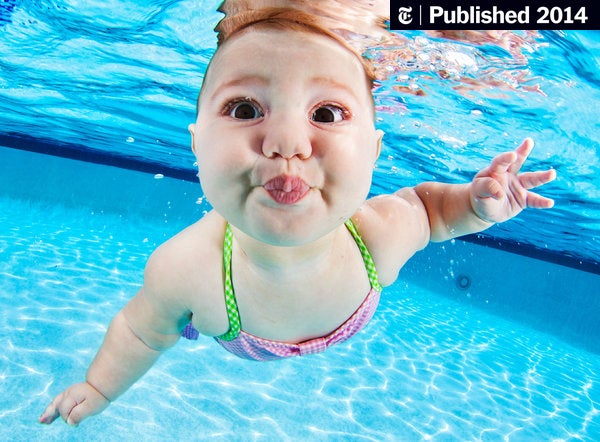When Can Babies Go in a Swimming Pool?

Whether you live in a climate that’s warm year-round (with swimming opportunities 365 days a year) or you have to relish your few summer months before the return of fall, you need to be equipped with all of the relevant safety information before bringing your baby into the pool.
If you just Googled, “is it safe for baby to go in swimming pool?” you’ve come to the right place. Let’s explore some common safety questions about baby swimming so that you and your little one can stay safe in the pool this year.
At What Age Is It Safe for a Baby to Go In a Pool?
When teaching your child or toddler to swim, it’s essential to start their training as early as possible. You want them to be comfortable and calm in the water, and you eventually want them to master a few basic swimming skills like floating on their back. So, how early is too early to start swim training?
Between the hygiene risk, babies’ sensitivity to sun and pool chemicals, and potential for drowning, infants should be at least six months old before entering a swimming pool. Exposing babies to swimming pool water without taking the proper precautions could result in infection, skin damage, and hypothermia.
Introducing young children to a swimming pool requires a keen understanding of water safety. We’ll explore some pool safety tips below to ensure success and safety when taking your infant swimming. Six months is the recommended age for a baby’s first swim, so let’s discuss why.
Can a 2-Month-Old Swim in a Pool?
It’s generally not recommended that babies under six months old swim in chlorinated pools, saltwater pools, or natural bodies of water. Taking your baby to a swimming pool too early could result in the following issues.
Skin damage
- Sunburn is a considerable risk for babies, and it’s recommended that babies stay in the shade as much as possible since they’re especially susceptible to sunburn.
- Make sure to apply sunscreen no less than 15 SPF, cover your baby with a hat, and consider putting on a long-sleeved swim shirt, even if they’re just going to sit poolside and not enter the water.
Drowning
- According to the CDC, drowning is one of the number one causes of unintentional death in children ages one to four years old.
- Drowning symptoms can sometimes present a few hours after exiting the pool. We’ll cover that in our section on dry drowning.
Infection
- Pool water is often too dirty for babies to swim in, even in chlorinated pools.
- Babies’ immune systems are incredibly vulnerable, especially during the first six weeks after birth. Exposing them to pool water contaminants could cause diarrhea or simply make them sick.
- Be sure to keep your at-home swimming pool as clean as possible if you plan to swim with your children.
Hypothermia
- Since babies have a higher surface area of skin relative to their body size than adults, they’re significantly more susceptible to hypothermia.
- Before swimming with your baby, check the water temperature. If it’s too cold for you, it’s too cold for the baby!
For all of the reasons above (and more), refrain from entering the pool with your little one (or enrolling in a swimming lesson) before they’re six months old.
When Can My Baby Start to Swim?

Your baby can start to swim at six months of age. However, it’s essential to begin swimming under the right circumstances. Unless you’re a trained professional, you should opt to sign your baby up for swimming lessons instead of teaching them yourself.
While introducing your six-month-old to the pool can help them become acclimated to the water, simply walk around the pool with them in your arms instead of trying to teach them swimming safety and basic skills right away. Leave swimming lessons to a trained professional.
How Can I Protect My Baby’s Skin From Chlorine?

Chlorinated water isn’t entirely safe for children under two years. While saltwater pools contain different chemicals than traditional chlorine pools, these chemicals can still pose a risk (in fact, chlorine production is ultimately the goal in saltwater pools).
Protect your baby’s skin from chlorine by limiting their time in pool water, thoroughly washing them with soap after swimming, and using a baby-safe lotion after bathing to return moisture to your baby’s skin.
Is a Chlorine Pool Safe for Babies?

In short, chlorinated water isn’t entirely safe for babies. A 2011 study found that children under two years of age who spent more than 20 hours total in chlorinated pools during their infancy were at an increased risk of bronchiolitis, an illness that can lead to the development of asthma and other respiratory complications later in life.
Can Chlorine Irritate Baby Skin?
While swimming in chlorinated pools can increase a baby’s risk of contracting various respiratory disorders, it can also irritate their skin, which is quite sensitive during the first two years of their life.
Limiting your baby’s pool time, washing with soap after swimming, and applying a baby-safe lotion after bathing can prevent skin irritation from chlorine. If your baby experiences an allergic reaction to pool water, visit your pediatrician to discuss your treatment and prevention options.
What Is Dry Drowning in Infants?

Dry drowning is a misnomer. Drowning is the impairment of respiratory functions (an example being an inability to breathe) due to submersion in water.
If your child has swallowed a significant amount of pool water during swimming or was unable to surface for any amount of time after sinking into the water, symptoms of drowning could present hours after they’ve exited the pool.
Some symptoms of delayed drowning include:
- Fever
- Change in skin color
- Persistent cough
- Vomiting
- Loss of consciousness
If your child is submerged and can’t surface for any amount of time in the pool, they need to be examined by a medical professional right away.
More Safe Baby Swimming Tips

If you’re still asking, “Is it safe for baby to go in swimming pool?” follow the tips above to make sure your little one enters the water at an appropriate age and with safety measures in place.
To further ensure safety, review the following tips for safe swimming for babies and young children.
- Learn CPR for babies, children, and adults so that you can act quickly in the event of an emergency.
- Wear sunscreen, skin-covering swimming clothes (like sun shirts), and hats. Pack your umbrella, or purchase one for your pool deck. Sun protection is integral for babies.
- Keep your baby hydrated during swimming, especially during the height of summer. Dehydration could lead to lightheadedness, which could result in poolside slips and falls.
- Never leave a baby (or any child) unsupervised in the pool area. Consider using “touch supervision,” where you remain close enough to your baby or child to be able to reach out and grab them at all times in case they submerge.
If you follow the safety tips above, you’re sure to provide your baby with a safe and fun swimming experience once they reach six months of age!

